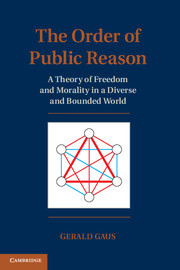Book contents
- Frontmatter
- Contents
- Preface
- I The Fundamental Problem
- PART ONE SOCIAL ORDER AND SOCIAL MORALITY
- II The Failure of Instrumentalism
- III Social Morality as the Sphere of Rules
- IV Emotion and Reason in Social Morality
- PART TWO REAL PUBLIC REASON
- Concluding Remarks on Moral Freedom and Moral Theory
- Appendix A The Plurality of Morality
- Appendix B Economic Freedom in States that Best Protect Civil Rights
- Bibliography
- Index
IV - Emotion and Reason in Social Morality
Published online by Cambridge University Press: 03 May 2011
- Frontmatter
- Contents
- Preface
- I The Fundamental Problem
- PART ONE SOCIAL ORDER AND SOCIAL MORALITY
- II The Failure of Instrumentalism
- III Social Morality as the Sphere of Rules
- IV Emotion and Reason in Social Morality
- PART TWO REAL PUBLIC REASON
- Concluding Remarks on Moral Freedom and Moral Theory
- Appendix A The Plurality of Morality
- Appendix B Economic Freedom in States that Best Protect Civil Rights
- Bibliography
- Index
Summary
It is far from wrong to emphasize the efficacy of all those practices which express or manifest our moral attitudes, in regulating behaviour in ways considered desirable; or to add that when certain of our beliefs about the efficacy of some of these practices turn out to be false, then we may have good reason for dropping or modifying those practices. What is wrong is to forget that these practices, and their reception, the reactions to them, really are expressions of our moral attitudes and not merely devices we calculatingly employ for regulative purposes. Our practices do not merely exploit our natures, they express them.
P. F. Strawson, “Freedom and Resentment”At the close of the previous chapter we began to examine the intimate relation between what Baier called “positive morality” and “true morality.” If we are going to understand what an adequate normatively justified social morality would be, we need to understand our current moral practices and the core claims implicit in them. Once moral theory abandons the aspiration to construct social morality from the ground up (or, as it were, to discover it for the first time), we must understand the fundamental features of our moral practices, and then we can seek to evaluate them from an impartial view – a moral point of view of free and equal persons. This chapter focuses on a fundamental feature of our social morality: the way it integrates the emotions and reason in our moral relations with others.
- Type
- Chapter
- Information
- The Order of Public ReasonA Theory of Freedom and Morality in a Diverse and Bounded World, pp. 183 - 258Publisher: Cambridge University PressPrint publication year: 2010
- 1
- Cited by



